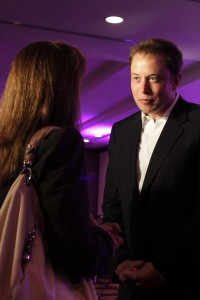
Elon Musk, CEO of SpaceX, talks with NASA Deputy Administrator Lori Garver at a luncheon given to honor his achievement of the Robert A. and Virginia Heinlein Prize for accomplishments in commercial space activity. (Chelsea Whyte/MEDILL)
WASHINGTON – Add one more high-flying achievement to the resume of Silicon Valley entrepreneur Elon Musk: Heinlein Prize Trust winner.
The award, named for science fiction writer Robert Heinlein, recognizes advancements in the commercial spaceflight industry. Musk received his prize Wednesday. The honor has only been bestowed once before, in 2006 to Peter Diamandis, another significant figure in the push for private
spaceflight.
The trust that administers the prize has been searching for another worthy innovator – and they found one in Musk, who is the CEO of Space Exploration Technologies, the California company developing rockets for missions to low-Earth orbit.
“We gave the first award back in 2006,” said Art Dula, trustee and literary executor for the Heinlein
Estate, “and since then we’ve been searching for accomplishments.”
Musk, the co-founder of the internet payment system PayPal and CEO of the electric car company Tesla has poured almost $90 million of his own money into the first three test flights of the Falcon 1 rocket, resulting in the first privately-funded vessel to successfully orbit Earth.
In 2008, SpaceX won a $1.6 billion contract from NASA to shuttle cargo to and from the International Space Station, and in May of 2011 won another $75 million from NASA to develop a crew carrying spacecraft to lift astronauts into orbit.
As he accepted the award, Musk acknowledged the partnership with NASA as an important part of his company’s success. “There’s a strong private role and a strong public role. We do have NASA to thank for our progress with the Falcon 9. We wouldn’t be where we are today without their help,” Musk said.
“This is a really key part of what we’re trying to do in space, to develop commercial cargo followed by crew to and from the International Space Station,” said NASA Deputy Administrator Lori Garver. “We’re thrilled by their progress and we look forward to several successful competitors.”
SpaceX’s progress is detailed in NASA’s Commercial Spaceflight Development Division status report,
released Wednesday. According to the report, the focus for SpaceX in the immediate future will be on improving the Launch Abort System, a critical component for the safe transport of crew.
The Heinlein Prize Trust recognized Musk for his achievement of putting a rocket into low-Earth orbit, but also emphasized that the prize recognizes advances in the commercialization of spaceflight. “A business has been built here that employs over 1000 people in good jobs in America, beats the Chinese price for rockets — and that’s amazing — and now has $3 million dollars or more of business on commercial contracts,” Dula said.
This goes hand in hand with NASA’s hopes for reduced costs, Garver said. “Our whole strategy is to be able to lower the cost of space transportation to low-Earth orbit so we can focus on the hard thing, going beyond low-Earth orbit.”
Leroy Chiao, astronaut and Heinelein Prize trust adviser, is a former commander of the International Space Station and said he has faith in commercial space ventures. Now is the time to explore privatization, Chiao said. “The technology is mature and now’s the chance to try and give them the chance to succeed and see if they can do it commercially.
Musk said SpaceX has been profitable for the past four years and has no immediate needs for capital but “there’s a good chance that we will IPO our company next year. The public markets are a very efficient way to raise capital, and it’s probably a good move to have a capital reserve.”
He indicated a concern about public markets not responding well to a unusually long-term wait for return on investments, but was optimistic about the coming years.
